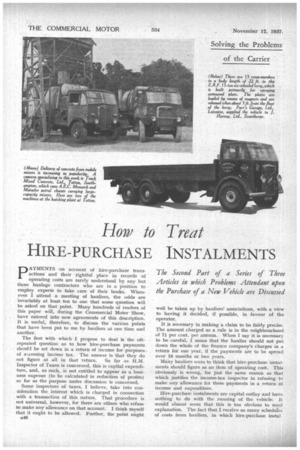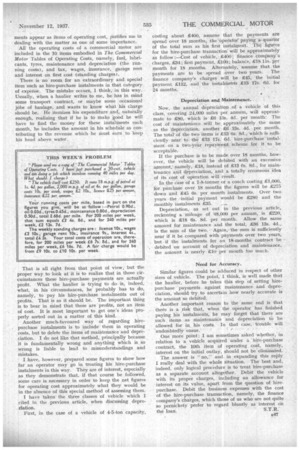How to Treat HIRE-PURCHASE INSTALMENTS
Page 30

Page 31

If you've noticed an error in this article please click here to report it so we can fix it.
pAYMENTS on account of hire-purchase transactions. and their rightful place in records of operating costs are rarely understood by any but those haulage contractors who are in a position to employ experts to take care of their books. Whenever I attend a meeting of hauliers, the odds are invariably at least ten to one that some question will be asked on that point. Many hundreds of readers of this paper will, during the Commercial Motor Show, have entered into new agreements of this description. It is useful, therefore, to discuss the various points that have been put to me by hauliers at one time and another.
The first with which I propose to deal is the oftrepeated question as to how hire-purchase payments should be set down in a return of income for purposes of accessing income tax. The answer is that they do not figure at all in that return. So far as H.M. Inspector of Taxes is concerned, this is capital expenditure, and, as such, is not entitled to appear as a business expense (to be calculated in reduction of profits) so far as the purpose under discussion is concerned.
Some inspectors of taxes, I believe, take into consideration the interest which is charged in connection with a transaction of this nature. That procedure is not universal, however, for there are others who refuse to make any allowance on that account. I think myself that it ought to be allowed. Further, the point might B46 well be taken up by hauliers' associations, with a view to having it decided, if possible, in favour of the operator.
It is necessary in making a claim to be fairly precise. The amount charged as a rule is in the neighbourhood of 74 per cent. per annum. When I say it is necessary to be careful, I mean that the haulier should not put down the whole of the finance company's charges in a return for one year, if the payments are to be spread over 18 months or two years.
Many hauliers seem to think that hire-purchase instalments should figure as an item of operating cost. This obviously is wrong, for just the same reason as that which justifies the income-tax inspector in refusing to make any allowance for these payments in a return of income and expenditure.
Aire-purchase instalments are capital outlay and have nothing to do with the running of the vehicle: It would almost seem that this is too obvious to need explanation. The fact that I receive so many schedules of costs from hauliers, in which hire-purchase instal
ments appear as items of operating cost, justifies me in dealing with the matter as one of some importance.
All the operating costs of a commercial motor. are included in the 10 items embodied in The Commercial Motor Tables of Operating Costs, namely, fuel, lubricants, tyres, maintenance and depreciation (the running costs), and tax, wages, insurance, garage rent and interest on first cost (standing charges).
There is no room for an extraordinary and special item such as hire-purchase instalments in that category of expense. The mistake occurs, I think, in this way. Usually, when a haulier writes to me, he has in mind some transport contract, or maybe some occasional jobs of haulage, and wants to know what his charge should be. He itemizes his expenditure and, naturally enough, realizing that if he is to make good he will have to find the money for these instalments each month, he includes the amount in his schedule as contributing to the revenue which he must earn to keep his head above water.
That is all right from that point of view, but the proper way to look at it is to realize that in those circumstances these hire-purchase payments are actually profit. What the haulier is trying to do is, indeed, what, in his circumstances, he probably has to do, namely, to pay his hire-purchase instalments out of profits. That is as it should be. The important thing is to bear in mind that these are profits, not an item of cost. It is most important to get one's ideas properly sorted out in a matter of this kind.
. Another much-favoured way of regarding hirepurchase instalments • is to include them in operating costs, but to delete the items of maintenance and depreciation. I do not like that method, principally because it is fundamentally wrong and anything which is so wrong is liable to lead to misunderstandings and mistakes.
I have, however, prepared some figures to show how far an operator may go in treating his hire-purchase instalments in this way. They are of interest, especially as they demonstrate that, if that course be followed, some care is necessary in order to keep the net figures for operating cost approximately what they would be in the absence of this special method of assessing them. have -taken the .three classes of vehicle which I cited in the previous article, when discussing depre ciation. costing about 2400, assume tliat the payments are spread over 18 months, the -operator' paying a quarter of the total sum as his first instalment. The figures for the hire-purchase transaction" will be approximately as follow :—Cost of vehicle, £400; finance company's charges, £34; first payment, 2.100; balance, 218 Es. Per month for 18 months. Alternately, assume that the payments are to be spread over two years. The finance company's charges will be 245, the initial payment £112, and the instalments 213 17s. 6d. for 24 months. •
Depreciation and Maintenance,
Now, the annual depreciation ,of a vehicle of this class, covering 24,000 miles per annum, will approximate to 280, which is £6 13s. 4d. per month: The cost of maintenance will be approximately the same as the -depreciation, another 26 13s. 4d. per month. The total of the two items is 213 6s. 8d., which is sufficiently near to the 213 17s. 6d. hire-purchase instalment on a two earrepayment scheme for it ' to be acceptable.
If the purchase is to be made. over 18 months, however, the vehicle will be debited with an excessive amount; namely, 218, instead of £13 6s. 8d., for maintenance and dePreciation, and a totally erroneous idea of its cost of operation will result.
• In the case of a 778-tonner or a coach costing 1,004), for purchase over 18 months the figures will be £275 down and £45 6s. per month instalments. Over two years . the initial payment would be 2280 and the monthly instalments 235.
Depreciation, as set out in the previous article, reckoning a Mileage of 48,000 per annum, is 2220, which is 218 6s. 8d. per month. Allow the same amount for maintenance and the total, 236 13s. 4d., is the sum of the two. Again,the sum is sufficiently near if it be compared with payments over two years, but if the instalments for an 18-months contract be debited on account of depreciation and maintenance, the amount is nearly 210 per month too much.
Need for Accuracy.
Similar figures could be adduced in respect of other sizes of vehicle. The point, I think, is well made that the haulier, before he takes this step of setting hirepurchase payments against maintenance and depreciation, should try to ascertain how nearly accurate is the amount so debited.
Another important reason to the same end is that there is a risk that, when the operator has finished paying his instalments, he may forget that "there are such items as maintenance and depreciation to be allowed for in his costs. In that case, trouble will 'undoubtedly ensue:
One more point; I am sometimes asked whether, in relation to a. vehicle accinired under a hire-purchase contract, the 10th item of operating cost, namely, interest on the initial outlay, should not be eliminated.
The answer is "no,” and in expanding this reply I really deal with the whole situation. The best and, indeed, only logical procedure is to treat hire-purchase as a separate account altogether. Debit the vehicle with its proper charges, including an allowance for interest on its value, *apart from the question of hirepurchase. Debit the business expenses with the cost of the hire-purchase transaction, namely, the finance
• company's charges, which those of us who are not quite so pernickety prefer to regard bluntly as interest On
the loan. S.T.R."








































